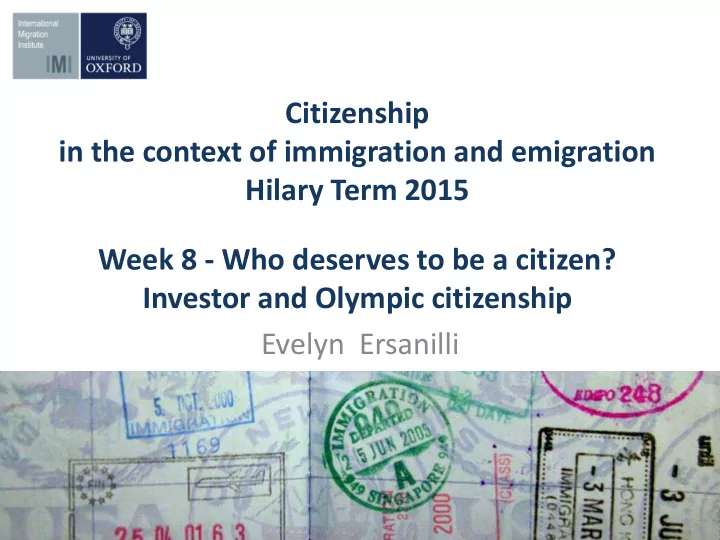

Citizenship in the context of immigration and emigration Hilary Term 2015 Week 8 - Who deserves to be a citizen? Investor and Olympic citizenship Evelyn Ersanilli 09 March 2015 Speaker name 1
Investor citizenship vs golden residence programmes Important differences: • Residence is easier to revoke than citizenship • Residence does not provide voting rights • Limited access to derivative rights such as mobility in regional association and visa free travel to other countries • Granting access to the territory (residence) does not imply becoming part of the imagined community of citizens But do these differences matter to applicants?
Olympic and investor citizenship compared Citizenship as rights Both types offer the same rights, but the ‘fee’ and the rights motivating applicants might differ: Investor citizenship: people pay to acquire citizenship, this citizenship in turn, allows them to reside in their new country of citizenship (and in the case of the EU, all member states of the regional body), and facilitates travel to other countries Olympic citizenship: athletes obtain citizenship in exchange for participation in international sports competitions on behalf of their new country. Citizenship can give access to better training facilities or might be the only way to participate in international events if the competition in the origin country is fierce
Olympic and investor citizenship compared Citizenship as identity Applicants: both investor and Olympic citizenship are acquired for pragmatic reasons not because applicants want to belong. Any different than for other applicants for citizenship? (Ochoa, 2014) State: reasons to offer citizenship to these groups not expressed in terms of belonging but in terms of national interest (the interest of the national community??) But… Olympic citizens are representatives of the country at international events, as such they are symbols of national identity
The consequences of investor and Olympic citizenship Rights: “Turning the status of citizenship itself into a marketable commodity would mean more than this. It would tear down a wall of protection that keeps social class from becoming, once again, a formal marker of inequality of citizenship rights and status .” ( Bauboeck, 2014: 20)
The consequences of investor and Olympic citizenship Identity 1. No long-standing relation with the country is required – either by residence or ethnicity: loosens the identity component of citizenship? 2. Access to citizenship regulated by skills/wealth redefining who is a good citizen?
How to relate investor and Olympic citizenship to rise in citizenship tests? “Following the period of liberalisation of nationality laws, provoked by the presence of a large and stable population of third-country nationals, restrictive measures in the field of nationality law are adopted [..] Integration is perceived as incomplete, or even a failure. [..] A revaluation of citizenship occurs, which is translated into stricter naturalisation requirements. ” (De Hart & Van Oers, 2006: 318)
How to relate investor and Olympic citizenship to rise in citizenship tests? “..states have tried to load citizenship with new meaning . This is the object of contemporary campaigns for unity and integration, which aim predominantly at the incorporation of immigrants and ethnic minorities. These campaigns are litmus tests for what unity and integration still means in post-national societies, irrespective of and beyond the case of migrants and minorities .” (Joppke, 2007: 44)
How to relate investor and Olympic citizenship to rise in citizenship tests? Paradox between emphasis on belonging and cultural competence in citizenship tests that have been spreading across Western-Europe and investor and Olympic citizenship that place no worth on belonging? • Partly different development in different countries • But (nearly) all European countries practice Olympic citizenship to some extent
How to relate investor and Olympic citizenship to rise in citizenship tests? “.. three intertwined processes (1) (re)formulations of social contracts between (potential) citizens, civil society, the state and the markets; (2) a renewed sacralization of the nation; and (3) a form of citizenship that involves an increased emphasis on the need to earn one’s citizenship” (Van Houdt et al, 2001: 410) Rise of citizenship test also a product of emphasis on needing to earn citizenship: change in ideas of what a ‘good citizen’ is. Olympic, investor citizenship and citizenship tests are all about showing worthiness to be a citizen, but the worth is expressed in different ways.
References Bauböck, R. (2014) ‘What is wrong with selling citizenship? It corrupts democracy!,’ p 19-22, in Shachar, A & R. Bauböck (eds.) Should Citizenship be for Sale? EUI working papers RSCAS 2014/01 de Hart, B. and van Oers , R. (2006) ‘European trends in nationality law’, pp 317 -57 in Bauböck, R., Ersboll, E., Groenendijk, K. and Waldrauch, H. (eds) Acquisition and Loss of Nationality: Policies and Trends in 15 European States . Amsterdam: Amsterdam University Press. Haaretz (2007) Athlete loses Bahraini citizenship for running in Tiberias marathon, 7 January 2007 Joppke, Ch. (2007) Transformation of Citizenship: Status, Rights, Identity. Citizenship studies , 11(1): 37-48. Kochenov, D. (2014) ‘Citizenship for Real: Its Hypocrisy, Its Randomness, Its Price’ , p 27-29, in Shachar, A & R. Bauböck (eds.) Should Citizenship be for Sale? EUI working papers RSCAS 2014/01 Ochoa, P. (2014) ‘What Money Can’t Buy: Face -to- Face Cooperation and Local Democratic Life,’ p23-24, in Shachar, A & R. Bauböck (eds.) Should Citizenship be for Sale? EUI working papers RSCAS 2014/01 Shachar, A. (2011) ‘Picking winners: Olympic citizenship and the global race for talent,’ Yale Law Journal , 120:2088-2139 Shachar, A. (2014) Dangerous Liaisons: Money and Citizenship, p 3-8, in Shachar, A & R. Bauböck (eds.) Should Citizenship be for Sale? EUI working papers RSCAS 2014/01 Van Houdt, F., Suvarierol, S., & Schinkel, W. (2011) ‘Neoliberal communitarian citizenship: Current trends towards ‘earned citizenship’ in the United Kingdom, France and the Netherlands,’ International Sociology , 26(3):408-432.
Recommend
More recommend